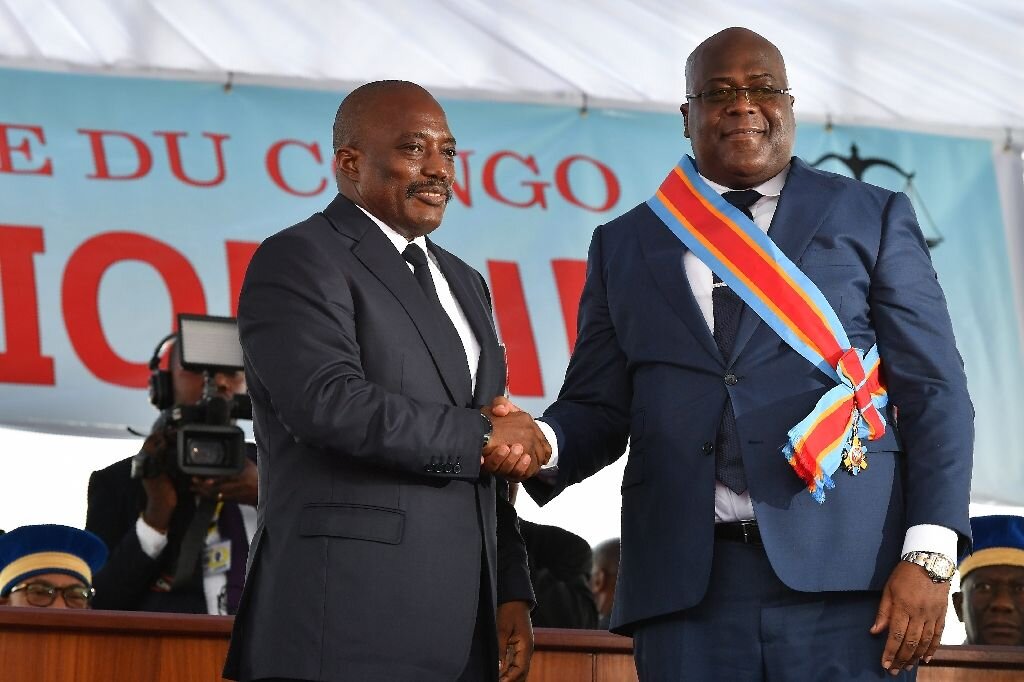DRC Returns to State of Conflict After Hopes of Peace
In the DRC’s first peaceful transition of power, Felix Tshisekedi (right) succeeded Joseph Kabila (left) as president (Image)
The Democratic Republic of the Congo is only a few months away from finishing its first year under a government that transitioned peacefully into power since achieving independence from Belgium in 1960. But the past few years have been marred by a re-eruption of the violence that scarred the country from 1999 to 2004 between the Lendu and Hema ethno-political interests in northern Ituri province. Recent clashes have displaced 300,000 people, either fleeing as refugees to neighboring Uganda or adding to the DRC’s existing 4.5 million internally displaced persons. Recently elected President Félix Tshisekedi made a recent speech urging Iturians to “love one another,” and ordered the national army to mobilize in Ituri in cooperation with existing UN peacekeeping operations, and in collaboration with the efforts of neighboring countries Uganda and Rwanda.
Violence between the Lendu and Hema first erupted in earnest in 1999, when northern DRC was occupied by Ugandan rebel forces, the Ugandan People’s Defense Force and the Congolese Rally for Democracy-Liberation Movement. Fighting was sparked when the Brigadier General of the UDPF created Ituri province and installed a Hema leader to head the administration, contrary to the objections of the RCD-ML, which recruited and trained both Lendu and Hema soldiers. This prompted Lendu attacks on Hema villages, creating a cycle of violence between the two groups. Conflict continued until the 2003 deployment of a European Union military force, which led to the conviction of key instigators by the International Criminal Court in some of its first rulings.
However, the conflict between the Lendu and Hema people is not recent, stemming from Belgian colonial rule. The minority Hema were favored by Belgians in independence proceedings, inheriting plantations and wealth to become a land-owning class that then had increased access to education and thus disproportionate political representation. Furthermore, the agricultural Lendu viewed the cattle-herding Hema as “outsiders” from Uganda, who settled the region after the Lendu and did not deserve the spoils of independence.
Although initial violence from the 1999 conflict was significantly diminished after the EU intervention, fighting in Ituri province began anew in March of 2018. The exact catalyst for the conflict is unknown, but many underlying factors exacerbate existing ethnic tensions, including the presence of oil deposits in the region, which suggests the possibility of international oil firms as possible motivators or financiers in the conflict. Another current theory is that former President Joseph Kabila encouraged the fighting, to excusably delay the elections that would bring his successor to power, as Kabila would be allowed to stay in office indefinitely if elections were plausibly delayed. Kabila came to power in 2001—in the midst of the first large-scale Ituri conflict—after the assassination of his father, who militarily deposed his predecessor in 1997. Kabila ultimately stepped down peacefully in January 2019, handing the reins over to current President Tshisekedi. However, it is widely suspected that Tshisekedi was unfairly elected in exchange for promising to protect the interests of his predecessor, as leaked election results show the majority of votes going to opposition leader Martin Fayulu, an accusation compounded by the fact that the majority of Tshisekedi’s new government executives have kept the same positions they occupied under Kabila.
Looking forward, although the election of Tshisekedi was dubious, it is still supported by the international community because of its status as the DRC’s first successful political transition of power since independence. Tshisekedi has capitalized on this support, strengthening ties with the African Union and flying to Washington, D.C. to discuss the DRC’s relationship with the United States, even after the U.S. placed sanctions on election officials to display their disapproval of the corrupt election proceedings. It has yet to be seen whether or not Tshisekedi’s deployment of the DRC national army, in coalition with the UN and neighboring countries, will be able to quash the violence that once again stains Ituri province, and whether peace negotiations, left unfinished and clearly unsuccessful after the first bout of violence, will finally and decisively discourage future conflict.

